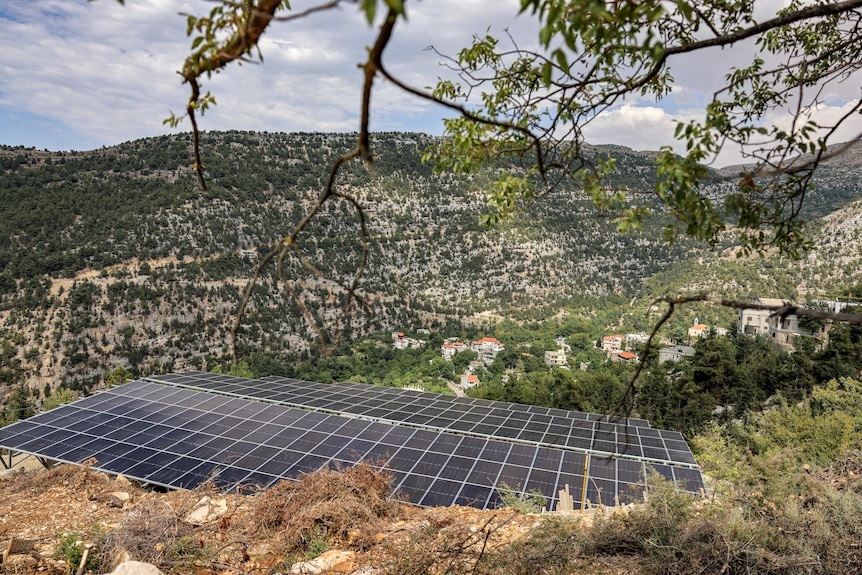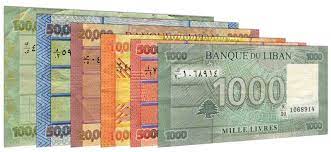
by AFP -- Ice cream is back on the shelves in the northern Lebanese village of Toula after two years of power cuts. Solar power has made its return possible. Lebanon's economy collapsed in 2019 after decades of corruption and mismanagement, leaving the state unable to provide electricity for more than an hour or two per day. Last winter, residents of Toula barely had three hours of daily generator-driven electricity. A large area of solar panels surrounded by vegetation.
Solar power now helps keep the lights on for 17 hours, an engineer working on the alternative energy project said. Mini-market owner Jacqueline Younes said she was waiting for the first order of ice cream to arrive. "For two years the kids have been asking for ice cream, now it's finally time," she said. While many Lebanese rely on costly generators for electricity, a growing number of homes, companies and state institutions are turning to solar. They are not doing it for environmental reasons but because it is their only option.
by AP — A U.S. court has ordered the Lebanese militant group Hezbollah to pay millions of dollars in damages to a …

By Najia Houssari -- arabnews.com -- BEIRUT: Lebanese banks began a three-day closure on Monday following a decision by the Association of Banks aimed at preventing break-ins and holdups by depositors. It comes after a series of high-profile incidents in bank branches, with depositors attempting to withdraw US dollar savings that have been frozen for three years. Caretaker Interior Minister Bassam Mawlawi described the bank break-ins in Beirut and other regions as “organized.”
The Association of Banks demanded that “necessary measures be taken” in order to ensure the safety of employees and customers, and to preserve depositors’ rights. Some bank central departments remained administratively functional on Monday, while the central bank’s Sayrafa platform was unaffected by the strike. The black market US dollar exchange rate failed to rise as significantly as expected as a result of the political and security turmoil in the country, with the rate standing at 38,350 Lebanese pounds. When branches reopen, a number of banks are planning strict self-protection measures by subjecting customers to inspections and only receiving those who have scheduled appointments.
President of the Lebanese Depositors Association Hassan Moghnieh warned that “the strike will not resolve the ongoing crisis. When work resumes next Thursday, banks might witness a new wave of holdups, which means that the solution resides elsewhere.” On Monday morning, a number of activists tried to break into the Justice Palace in Beirut in protest against the detention of activists who took part in bank holdups. The army prevented the families and activists from entering the palace. Screams were heard as protesters demanded the release of Mohammed Rustom and Abdul Rahman Zakaria, who were detained for breaking into Blom Bank to support depositor Sali Hafiz, who had earlier used a plastic gun to demand her deposit to treat her sick sister.

by Malek el Khazen: Many Lebanese companies that receive all fresh dollars and accept only fresh dollars are still paying their employees in Lebanese pounds. It's a shame. Occasionally, they pay half of the salary in Fresh Dollars and the other half in Liras or "lollars". Why is that? We can easily blame our government for failures and corruption. The fact that these employees are still paid in "liras" is a complete travesty. Stop pointing the fingers at the government, you are no better if you are getting paid in fresh dollars and are not paying your employees in fresh dollars. if we don't start at the micro level and reject taking advantage of the new financial situation! You can begin by yourself.
by watchdogsgazette.com -- Jad El Dilati - The only thing that an employer needs to do in modern-day Lebanon to attract job seekers is to write “paid in fresh dollars” in the job’s description, no matter how low the amount of dollars is. At a time when the country faces one of the world’s worst financial crises since the 19th century according to the World Bank when 50% of the country’s population is living below the poverty line, and with the unemployment rate on a sharp rise, finding a job that pays in fresh dollars, cash dollars, in Lebanon feels like winning the lottery. This is an alarming illusion. To understand why getting paid in fresh dollars today feels like a privilege, one has to take a step back and look at the general image existing in Lebanon. The type of salary that you earn comes down to what sector you work in. People working in the public sector, including teachers in public schools, security personnel, army members, and any job funded by the state, get paid in Lebanese liras (LBP).
Intra-sector differences arise among the private sector where most of the people working in private companies still get paid in Lebanese liras especially if the company is based in Lebanon. However, a good portion of private companies are paying their employees either a full salary or part of a full salary in fresh USD. Those companies are mainly tech companies who have foreign customers, companies that provide services to the Gulf Cooperation Council (GCC), and mostly any company that exports because those have become exceedingly scarce. Some companies that are currently paying their employees in USD include KPMG and PWC, both foreign. Almost all self-employed individuals also earn wages in LBP. Most Lebanese citizens work in the first two mentioned sectors or are self-employed, and thus earn their salaries in LBP. 95% of them do. This means that, if you are a person residing in Lebanon, earning fresh US dollars every month, at a time where one US dollar is worth 30,000 LBP, you are better off than 95% of the population. Amidst the continuous devaluation of the local currency, and the increasing difficulty in finding actual US dollar bills, earning fresh dollars seems like a prerogative. This feeling of privilege paved the path towards the savage exploitation of the Lebanese working class that is being witnessed today.
“Must-haves: 2 years of experience in business, 2 years of experience in marketing, experience in management, 4 years of business development experience. Expected salary: 200 fresh USD/ month!” An exclamation point is always added to make the low salaries look appealing. This was an ad for a telesales and marketing managerial full-time position for a company in Beirut that I saw on LinkedIn after less than a minute of scrolling. To put into perspective how substandard this salary is, it is necessary to compare it with the salary associated with the same job in other countries on one hand, and with the Lebanese minimum wage on the other hand while taking into account Lebanon’s current miserable conditions. Aِ marketing manager in the United States with this many years of experience would earn $126,560 a year which means they would be earning a monthly salary of $10,546. Thus, a marketing manager working in the United States would be earning 52 times the amount that an identical manager would be earning here. Certainly, one cannot compare the size of the Lebanese and the American economies. However, the private company offering the position in Beirut is run by a Lebanese expat whose revenue is entirely in “fresh dollars” because the company’s finances are all managed abroad. This implies that this employer is familiar with the market of such a job, is able to raise the wages to meet even a quarter of what should be earned yet chooses not to since they are well aware of the desperate need for fresh USD today.
Khazen History


Historical Feature:
Churches and Monasteries of the Khazen family

St. Anthony of Padua Church in Ballouneh
Mar Abda Church in Bakaatit Kanaan
Saint Michael Church in Bkaatouta
Saint Therese Church in Qolayaat
Saint Simeon Stylites (مار سمعان العامودي) Church In Ajaltoun
Virgin Mary Church (سيدة المعونات) in Sheilé
Assumption of Mary Church in Ballouneh
1 - The sword of the Maronite Prince
2 - LES KHAZEN CONSULS DE FRANCE
3 - LES MARONITES & LES KHAZEN
4 - LES MAAN & LES KHAZEN
5 - ORIGINE DE LA FAMILLE
Population Movements to Keserwan - The Khazens and The Maans
ما جاء عن الثورة في المقاطعة الكسروانية
ثورة أهالي كسروان على المشايخ الخوازنة وأسبابها
Origins of the "Prince of Maronite" Title
Growing diversity: the Khazin sheiks and the clergy in the first decades of the 18th century
Historical Members:
Barbar Beik El Khazen [English]
Patriach Toubia Kaiss El Khazen(Biography & Life Part1 Part2) (Arabic)
Patriach Youssef Dargham El Khazen (Cont'd)
Cheikh Bishara Jafal El Khazen
Patriarch Youssef Raji El Khazen
The Martyrs Cheikh Philippe & Cheikh Farid El Khazen
Cheikh Nawfal El Khazen (Consul De France)
Cheikh Hossun El Khazen (Consul De France)
Cheikh Abou-Nawfal El Khazen (Consul De France)
Cheikh Francis Abee Nader & his son Yousef
Cheikh Abou-Kanso El Khazen (Consul De France)
Cheikh Abou Nader El Khazen
Cheikh Chafic El Khazen
Cheikh Keserwan El Khazen
Cheikh Serhal El Khazen [English]
Cheikh Rafiq El Khazen [English]
Cheikh Hanna El Khazen
Cheikha Arzi El Khazen
Marie El Khazen